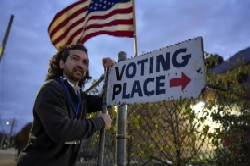from Channels Television
Trump Ran On Fighting Inflation, but Investors Are Betting He’ll Make it Worse
Donald Trump’s second-term policies are seen by investors as posing potential threats to the fight on inflation.
by Diccon Hyatt
Investopedia
:max_bytes(150000):strip_icc():format(webp)/GettyImages-2182548293-c77ede666a9d47ad8c732297fecd730a.jpg) President-elect Donald Trump won his second term in office Tuesday after promising to fight the inflation that has hammered household budgets since 2021—however, financial markets are betting he’ll make it worse instead.
President-elect Donald Trump won his second term in office Tuesday after promising to fight the inflation that has hammered household budgets since 2021—however, financial markets are betting he’ll make it worse instead.
Yields on 10-year Treasurys surged Wednesday in the wake of Trump’s victory, rising as high as 4.47%, their highest level since July. Treasury yields tend to be heavily influenced by investor concerns about inflation, with higher yields signaling concerns about greater inflation risks ahead. Economists widely believe several of Trump’s policy proposals—especially his tariffs on imports—could accelerate the rising cost of living.
“We expect tariffs and tax policy will be the focus for economic policy early in a second Trump administration,” David Seif, chief economist for developed markets at Nomura, wrote in a commentary. “Tariffs are likely to be inflationary and negative for growth.”
Voters Voiced Frustration Over Inflation. Some Economists Expect Trump’s Policies to Worsen It.
Expanded tariffs and mass deportations would raise prices, some experts say.
[Ed. Note: “mass deportations would raise prices”… said no previous economist EVER.]
by Max Zahn
ABC News
 Voters swept President-elect Donald Trump back into office on what appears to be a swell of discontent over the state of the U.S. economy.
Voters swept President-elect Donald Trump back into office on what appears to be a swell of discontent over the state of the U.S. economy.
More than two-thirds of voters say the economy is in bad shape, according to the preliminary results of an ABC News exit poll. Forty-five percent of voters say their own financial situation is worse now than it was four years ago, which exceeds the share who held that view in the immediate wake of the Great Recession in 2008, the poll found.
Yet despite their frustrations about the cost of living, voters elected a candidate whose economic policies are widely expected to worsen inflation and hammer household budgets, experts told ABC News.
Trump’s proposals of heightened tariffs and the mass deportation of undocumented immigrants could raise prices for everything from coffee to bananas to smartphones, experts said.
The Inflation Election
Elections are decided by how people feel, and lots of Americans still feel pretty grumpy about how much it costs to go to the grocery store these days.
by Eric Boehm
Reason.com
 In retrospect, the most important incident along the road to this Election Day may not have been the Democratic Party’s decision to shove aside President Joe Biden, or the unprecedented (and undemocratic) elevation of Vice President Kamala Harris to the top of the ticket. It wasn’t the Republican Party’s inability to break out of the thrall that Donald Trump holds over it, or the two assassination attempts aimed at him.
In retrospect, the most important incident along the road to this Election Day may not have been the Democratic Party’s decision to shove aside President Joe Biden, or the unprecedented (and undemocratic) elevation of Vice President Kamala Harris to the top of the ticket. It wasn’t the Republican Party’s inability to break out of the thrall that Donald Trump holds over it, or the two assassination attempts aimed at him.
The thing that most shaped this election happened long before all that. It was a decision made in the early days of the Biden administration. With the last election barely in the rearview window, Biden pushed a major stimulus bill through Congress—a bill that spent $1.9 trillion, nearly all of it borrowed—despite warning signs that the already recovering economy might not be able to handle the full-throttle infusion of more dollars.
Voter Survey: Harris Voters Motivated by Democracy, Trump Supporters by Inflation and Immigration
by Josh Boak and Linley Sanders
LA Times
 WASHINGTON — Voters for Kamala Harris and Donald Trump who cast their ballots for Tuesday’s presidential election had vastly different motivations — reflecting a broader national divide on the problems the United States faces.
WASHINGTON — Voters for Kamala Harris and Donald Trump who cast their ballots for Tuesday’s presidential election had vastly different motivations — reflecting a broader national divide on the problems the United States faces.
AP VoteCast, an expansive survey of more than 110,000 voters nationwide, found a country mired in negativity and desperate for change as Americans faced a stark choice between former President Trump and Vice President Kamala Harris. It found that the fate of democracy appeared to be a primary driver for Harris’ supporters. It was a sign that the Democratic nominee’s persistent messaging in her campaign’s closing days accusing Trump of being a fascist may have broken through.
By contrast, Trump’s supporters were largely focused on immigration and inflation — two issues that the former Republican president has been hammering since the start of his campaign. Trump has pledged that tariffs would bring back factory jobs and that greater domestic oil production would flow through the economy and lower prices.
Poor Americans Disproportionately Crushed by Biden-Harris Inflation
by Austin Gae
The Heritage Foundation
 All Americans are facing rising prices under the Biden-Harris administration, despite its claim that it’s “fighting to lower costs,” but the burden of soaring costs falls disproportionately on low-income families.
All Americans are facing rising prices under the Biden-Harris administration, despite its claim that it’s “fighting to lower costs,” but the burden of soaring costs falls disproportionately on low-income families.
They spend a higher share of their income on necessities such as food and energy, which have seen above-average inflation. And since they already tend to buy the cheapest brands, they have far fewer low-cost alternatives.
A simple trip to the grocery store will frustrate many Americans. Since January 2021, the price of cereal and bakery goods has risen 25%, and chicken, the most common meat, has increased by 24%. As you head back home, you realize your car needs refueling, only to find yourself paying 45% more at the pump. You arrive home and turn on the lights, knowing that your electricity bill will be 31% more than it used to.
Here’s Why You Can’t Blame Presidents for Inflation
by Janet Nguyen
Market Place
 During the worst of the pandemic, prices started rising everywhere. Groceries, cars (both new and used), gasoline, housing. At one point, inflation reached 9.1%, the highest level since 1981, although it’s since cooled down.
During the worst of the pandemic, prices started rising everywhere. Groceries, cars (both new and used), gasoline, housing. At one point, inflation reached 9.1%, the highest level since 1981, although it’s since cooled down.
When things get more expensive, some want to blame the current presidential administration. Former president Donald Trump said both President Joe Biden and Vice President Kamala Harris were responsible for the record levels of inflation that consumers saw in recent years.
But presidential policies did not drive the record inflation we saw during the pandemic, economists told Marketplace.
“I think that people generally over attribute control over the macroeconomy to presidents,” said Tyler Schipper, an associate professor of economics at the University of St. Thomas.
After Likely Quarter-Point Rate Cut, Fed May Slow Pace of Drops if Inflation Lingers
by Paul Davidson
USA Today
 After slashing its key interest rate by a hefty half percentage point in September, the Federal Reserve is expected to lower rates by a more measured quarter point Thursday and several times next year as inflation continues to ease.
After slashing its key interest rate by a hefty half percentage point in September, the Federal Reserve is expected to lower rates by a more measured quarter point Thursday and several times next year as inflation continues to ease.
But if the Fed veers from that steady pace, it likely would be to reduce rates less sharply to ensure inflation keeps falling, economists say.
That may defy some forecasters’ view that the central bank largely has won the battle against soaring prices and must bring down interest rates swiftly to achieve a “soft landing” that avoids a recession.
Kamala Harris Looks at Script, ‘Handlers’ to Answer Simple Grocery Inflation Question
by Olivia Rondeau
Breitbart.com
 Vice President Kamala Harris appeared to rely on a script and coaching from her off-camera advisers to answer a simple question about reducing the prices of groceries on a popular health YouTuber’s podcast.
Vice President Kamala Harris appeared to rely on a script and coaching from her off-camera advisers to answer a simple question about reducing the prices of groceries on a popular health YouTuber’s podcast.
When Dr. Mike Varshavski, a content creator with nearly 13 million YouTube subscribers, asked Kamala Harris if there are “any plans to perhaps bring down prices of these whole foods, groceries, making sure that they’re widely available,” she immediately looked down at something out of her camera’s frame:
[…] “Well, one of, one area of focus for me is, without any question — in fact, it’s my highest priority — is bringing down the cost of living, period, which includes the cost of groceries,” the Democrat candidate said as she continued to glance downwards.
What to Expect From October’s CPI Inflation Report
by Simon Moore
Forbes
![]() Further evidence of disinflation is expected with October’s Consumer Price Index report. However, with inflation close to the Federal Open Market Committee’s 2% annual goal, jobs data is likely to have a greater bearing on the FOMC’s upcoming interest rate decisions. Still, relatively good news on inflation is expected.
Further evidence of disinflation is expected with October’s Consumer Price Index report. However, with inflation close to the Federal Open Market Committee’s 2% annual goal, jobs data is likely to have a greater bearing on the FOMC’s upcoming interest rate decisions. Still, relatively good news on inflation is expected.
When Is The October CPI Report?
CPI figures for the month of October 2024 are scheduled to be released on November 13 at 8:30 a.m. ET. This is the earlier of two major inflation releases for the month, with Personal Consumption Expenditure Price Index being released on at 10 a.m. ET on November 27 as part of the Personal Income and Outlays report. The FOMC prefers the PCE as an inflation metric. However, CPI tends to have more market impact because it is released earlier and the CPI and PCE metrics are often aligned.
As the Election Winds Down, Worries of ‘Bond Vigilantes’ and Inflation Hit Markets
In the case that Donald Trump defeats Kamala Harris, some see a scenario in which rising fiscal deficits, along with a potential global trade war, could mean higher inflation and surging bond yields.
by Jeff Cox
CNBC.com
 The potential that Donald Trump could prevail in the presidential race has contributed to sentiment in financial markets that the firebrand candidate’s policies could stir both economic growth as well as inflation.
The potential that Donald Trump could prevail in the presidential race has contributed to sentiment in financial markets that the firebrand candidate’s policies could stir both economic growth as well as inflation.
In the case that Donald Trump defeats Kamala Harris, some see a scenario in which rising fiscal deficits, along with a potential global trade war, could mean higher inflation and surging bond yields, along with gains in the stock market.
Being that yields and prices move in the opposite direction, that would be bad for underlying fixed income value. Depending on how things trend, there’s even talk about the return of “bond vigilantes” — traders who essentially force the government’s hands by either eschewing government debt or selling it outright.
